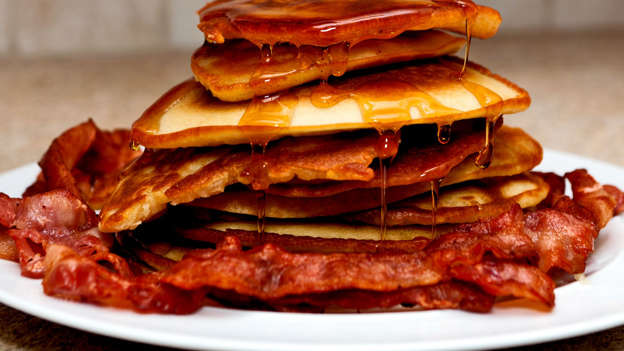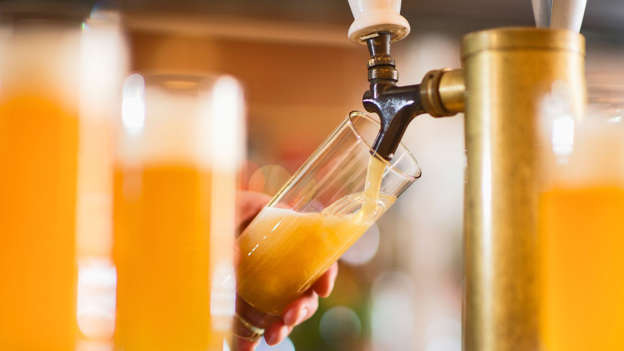Most of us can lose our train of thought midway through a sentence but when you're a stand-up comic, it can spell disaster – as comedian Billy Connolly knows. The 70-year-old Scot admitted last week he now suffers from worrying bouts of memory loss on stage and sometimes cannot remember his punch lines for gags. But absent-mindedness is not just about "senior moments", says neuropsychologist Dr Joanna Iddon, co-author of Memory Boosters (Hamlyn Press, £6.99) "In fact, it was the younger, busier people that were the most absent-minded. "Luckily, there are some tricks and strategies to help you banish those thingumabob moments." "More simply, when in an exam, I advise my students to visualise the place in which they were revising as a cue to memory," says Andrew Johnson, memory specialist and lecturer in psychology at Bournemouth University. "Later, when you want to retrieve the information, clench the left fist. Researchers think the movements activate brain regions key to the storing and recall of memories. "This is because there are fewer 'new' interfering memories so you will remember it better the next day." Researchers at Hiroshima University in Japan split 132 students into three groups and gave each one tasks such as playing the game Operation – where body parts are removed without making contact with a livewire – or finding a number in a random sequence. After one attempt, they spent several minutes looking at cute pictures of kittens or puppies and did it again. Scientists asked 972 people to fill in detailed surveys on their diets and to complete eight rigorous tests to check their concentration, memory and learning abilities. What are the superfoods that improve your memory? Forget what it looks like to others! That's because the left and right sides of the brain perform different functions and improving communication between them can bolster mental performance. The horizontal movement group recalled more words than the other two, according to results in the journal Brain and Cognition. And the more you drink, the less deep – or REM – sleep you get. This is the easiest of all methods for remembering everything from where you put your car keys to what you need from the shop to revising for a test, say memory experts. When someone gives you a phone number, use 'chunking' as a way of remembering it, suggests Dr Moulin. Try to chunk numbers according to something you find meaningful, like the age of someone you know, an address or a famous date (1066 Battle of Hastings) then they form a story to help you remember." When 69 students aged 18 to 25, were asked to memorise a list of tasks, those who had never smoked did best, remembering to complete 81% of the tasks. A separate study at King's College London found that middle-aged smokers performed less well on tests compared with those without the tobacco habit. If there's something you have to do every day at a specific time and often forget, a technique called implementation intentions is very simple, says Dr Moulin. One type of mnemonic – or memory aid – relies on imagery rather than words. So, if you meet John Bridge – imagine a bridge on his face. Psychologists have found that the more bizarre and vivid the image the better it works. While the digits 5019114421945 are hard to remember as they are meaningless, try assigning each set of three digits a meaning, advises Dr Moulin. These facts may not be easy to remember – but not so hard as digits in raw form. Look for meaning in everything – especially if you can refer it back to yourself. The study, in the journal Neurology, studied the diets of 17,478 people with an average age of 64. Eating too much can double the risk of memory problems in old age, according to US research. Learning a foreign language can boost the brain – even as an adult. Research carried out at Edinburgh University found verbal fluency and intelligence improved in 262 people who took on another tongue. The effects were present in those who learned their second language early, as well as later in life. "Our study shows that bilingualism, even when acquired in adulthood, may benefit the ageing brain." "It's thought the micronutrients called flavonoids, particularly in red wine, improve brain function," explains Dr Iddon. Eating chocolate can improve your memory, said Oxford University scientists, who tested 2,000 volunteers. A good sleep triggers changes in the brain that help to improve memory. The findings, by experts at the Beth Israel Deaconess Medical Centre in the US, came from MRI scans on volunteers' brains to see which parts are activated after a good night's rest. Researchers said: "When you are asleep, it seems as if you are shifting memory to more efficient storage regions. If you're in the kitchen, and remember you need to close the bedroom window, think of the curtains flapping. This avoids the 'Now, what did I come in here for?' scenario! "Pursue a hobby, join a book club or do an evening class. It will stop your brain atrophying." Music with strong rhythms and patterns – like reggae and salsa – are best for memory and problem-solving. The more complex the dance, the more the brain will be . But according to psychologists at Northwestern University in the US, it can also make it work better. The results showed those who had spent time studying overseas performed much better, possibly because moving to a strange country involves a major psychological transformation that helps to expand the mind. In memory tests, doodlers performed 29% better than non-doodlers when asked to recall names and places, Plymouth University researchers found. The brain is highly susceptible to its surroundings. And that includes colour. They had to perform tasks using words or images on a computer displayed against red, blue or neutral backgrounds. Those exposed to blue scored more highly on tasks requiring imagination and creativity. "But for a solution to fight obesity or smoking you should be in a blue room." > Forgetting what you went upstairs for. > Putting things down and being unable to find them soon after. > Forgetting the name of someone you've just met. Our short-term memory is very distractible. > Multi-tasking becomes difficult – an able cook suddenly finds preparing a Sunday roast overwhelming. > Forgetting the names of close friends and relatives. > Repeating a question asked half an hour previously. However, say experts, if you're aware of your memory problems, this is unlikely. If concerned, see your GP. 2/13 SLIDES © Bacon and pancakes -© Super Shawn-Getty Images- 3/13 SLIDES © A couple watching tv (© Moodboard /Getty Images) — Only watch TV when you have something specific you want to see, instead of channel surfing. — Create a TV-watching plan with time parameters and stick to it. — Make a list of alternative activities, particularly those that engage the mind. — Drink one glass of water for every alcoholic drink. — Have a substitute beverage that looks like a drink, such as root beer or soda water with a wedge of lime. 5/13 SLIDES © A full ashtray of cigarettes (© Kurt Drubbel /Getty Images) — Hypnotherapy: Hypnosis for smoking cessation works well for some people, according to Raskin, although it does not work for everyone. — Electronic cigarettes: A recent study shows that these over-the-counter, battery-operated devices that provide nicotine through inhaled vapor may not only ease cravings, but improve memory as well. 7/13 SLIDES © A basket of fries and a hotdog -© Lauri Patterson -Getty Images- 8/13 SLIDES © A glass of water (© Dave Les Jacobs/Getty Images) 9/13 SLIDES © A man flossing (© Image Source /Getty Images) — Keep floss on a nightstand next to your bed as a reminder to floss before going to sleep. "The time you take to floss will save you thousands of dollars in dental care in the future," Marut says. 11/13 SLIDES © A man exercising (© Cameron Whitman/Getty Images) 12/13 SLIDES © A woman sleeping on a couch (© Kaz Chiba/Getty Images) 13/13 SLIDES © A stressed out woman (© Jamie Grill /Getty Images) 




Breaking bad habits
Breaking any bad habit — from overeating to smoking — takes a plan. The problem is what works for one person may not work for another. Here, experts give their top tips for breaking the toughest bad habits. Overeating
Cutting calories often sets off cravings, despite the best intentions. A study published in the journal Steroids in March 2012 says it may be best to simply give in. Study participants who enjoyed a sweet dessert along with a high-protein breakfast lost weight and kept it off. Among the 200 obese adults in the study, those who ate a donut or other sweet cake along with a high-protein food lost 15 more pounds at the study's end compared to non-sweet eaters, while the non-sweet eating group regained 22 pounds. Researchers believe the higher protein content plus the added sweet kept cravings at bay. Combine this with less nighttime eating and you may be able to break the overeating cycle, says JJ Virgin, nutritionist and author of "The Virgin Diet: Drop 7 Foods, Lose 7 Pounds, Just 7 Days." Excessive TV watching
The average person watches four hours of TV a day, according to Nielsen. Since several studies link excessive TV viewing with increased risk of developing Type 2 diabetes and heart disease, cutting back may help reduce this risk. "In order to cut back on your viewing, first find your motivation," says Lisa Bahar, M.A., a family therapist and licensed clinical counselor in Newport Beach, California. "Once you find your motivation, list the long-term benefits and the short-term benefits." In addition: Over-imbibing
If you're tired of waking up hung over after a night of overindulging, want to lose weight or simply feel it may be a good idea to cut back on alcohol, several approaches can help, says Damon Raskin, M.D., a board-certified internist specializing in addiction detoxification at Cliffside Malibu Treatment Center in Malibu, California. Try these tips from Raskin:Cigarette smoking
Nicotine's addictive effect makes quitting smoking notoriously difficult. "It's tough to quit on your own," Raskin says. "It's best to make a plan with your doctor." A strategy may also be to include family and support groups in your cessation plan. In addition, plan to quit during a quiet period in your life, not in the midst of the holidays or times when you're stressed at work. Other approaches to try include:Nail biting
As nail biting is a reaction to stress, anxiety or nervousness, a plan to quit begins with a relaxation plan, therapist Bahar says. "Any time you make a commitment to stop a habit, you need to first create a self-care plan. A mindful approach can be very helpful," Bahar says. In the moment, consider the reason you are starting to bite your nails: Are you nervous, do you feel anxious, or are you bored? Each time you get the urge to bite a nail, engage in an action that distracts your mind and provides a physical outlet that occupies your hands, like gardening, cooking, grooming a pet, cleaning, washing dishes, or picking flowers. Consider seeing a therapist if you're unable to break the habit on your own. Eating too much fast food
It may be more convenient to go through a fast-food drive-thru window than to make a meal at home, but a steady diet of food high in calories, sodium and fat creates a perfect storm of obesity and health issues. Your taste buds may even get hooked on the hyper-palatable ingredients, says Danielle Omar, M.S., a registered dietician from Fairfax, Virginia, and founder of FoodConfidence.com. "Try to wean yourself off of fast food/take out by learning how to make your favorite fast food dish — only better than the restaurant version," Omar says. Foods such as pizza, sub sandwiches and Mexican fare are pretty easy to make at home, and they're a lot healthier when you can control the ingredients. Not drinking enough water
The Institute of Medicine recommends that healthy women drink 91 ounces (2.7 liters) of water a day and men drink 125 ounces (3.7 liters) from all food and beverages. Heat exposure and long bouts of exercise increase these water requirements. Getting in all that water can be a challenge. "Keep a water glass in the bathroom and get into the habit of drinking one to two cups of water after brushing your teeth in the morning, and then again after breakfast," Omar says. For flavor, add sliced lemon or other fruit, mint and other herbs, cucumber or flavored stevia drops, or mix water with 2 to 4 ounces (60 to 120 ml) of unsweetened juice. "Herbal tea is a great option and counts toward water intake, too," Omar says. Not flossing
Failure to floss not only increases the risk of gum disease, but can also contribute to heart disease, research suggests. Yet, only half of Americans floss their teeth once a day, according to the American Dental Association. Dan Marut, D.M.D., president and founder of Quality Dental Plan, a dental membership savings plan developed for dentists, suggests getting in the habit in several different ways:
— Place your floss in the shower, when you are already in "cleansing" mode. Hooked on artificial sweeteners
Adding artificial sweeteners to coffee and foods in an effort to lose weight may actually accomplish the opposite effect. Animal studies link the use of artificial sweeteners to weight gain, even when total calorie counts were similar. Slowly cutting back on artificial sweeteners and substituting natural sweeteners such as cinnamon can help break this habit, dietician Omar says. Swap out artificial sweeteners with stevia powder, coconut sugar, liquid coconut nectar (both are lower on the glycemic index than cane sugar or honey) and maple sugar powder, which has fewer calories than cane sugar. Use natural applesauce to sweeten baked goods. Not exercising
It's well-known that most people fall short of the recommended 30 minutes per day of activity recommended by the American College of Sports Medicine. Setting the bar much lower may be the way to get started, says Irv Rubenstein, Ph.D., exercise physiologist and founder of S.T.E.P.S., a fitness facility in Nashville, Tenn. "Being told we need to exercise 30 to 60 minutes stops most people from even trying. Start by creating little habits that burn even five to 10 calories," Rubenstein says. He also recommends moving while sitting at your desk by tapping your toes, rolling your shoulders up and back and performing other "fidgety" activities. Do the same while watching TV at home. "Start with 10 minutes a day of increased activity and add a minute or two every day to create the habit of moving," says Rubenstein. Falling asleep on the couch
Nodding off in front of the TV reduces total sleep time and interferes with sleep quality, says Allen Towfigh, M.D., a board-certified sleep medicine doctor and neurologist affiliated with New York Presbyterian Hospital/Weill Cornell Medical Center. "Exposure to bright light stimulates our brains to stay awake. Furthermore, even once we fall asleep, sound can cause us to get less refreshing sleep even if we sleep the same number of hours," Towfigh says. If you've conditioned yourself to fall asleep with the TV on, try substituting a white noise machine instead, which doesn't have the same bright light and fluctuating volume as a TV, Towfigh suggests. Or try iPhone apps such as Relax Melodies or Sleep Pillow. Not making time to de-stress
Leading a stressful lifestyle takes its toll on your body and mind. Over time, stress manifests in symptoms ranging from headache and fatigue to chest pain, depression and overconsumption of alcohol or food. "Plus, when you're stressed, your survival instincts hijack the logical, thoughtful part of your brain needed to make good decisions," says Heidi Hanna, Ph.D., a performance coach and author of "The Sharp Solution: A Brain-Based Approach for Optimal Performance." "Every hour, make it a point to give yourself a few minutes to shift into relaxation mode. Taking just a few moments to concentrate on the physical sensations of slow, relaxed breathing provides a boost in positive endorphins in the brain, relaxes muscle tension and even decreases inflammation. "Several apps are available that will send you gentle reminders throughout the day to pause and reflect, such as Bloom by Mindbloom, and GPS for the Soul. www.keralites.net 
![]()
![]()
![]()






Posted by: Sujith Pv <sujithputhiya@yahoo.com>
| Reply via web post | • | Reply to sender | • | Reply to group | • | Start a New Topic | • | Messages in this topic (1) |

To subscribe send a mail to Keralites-subscribe@yahoogroups.com.
Send your posts to Keralites@yahoogroups.com.
Send your suggestions to Keralites-owner@yahoogroups.com.
To unsubscribe send a mail to Keralites-unsubscribe@yahoogroups.com.
Homepage: http://www.keralites.net





No comments:
Post a Comment